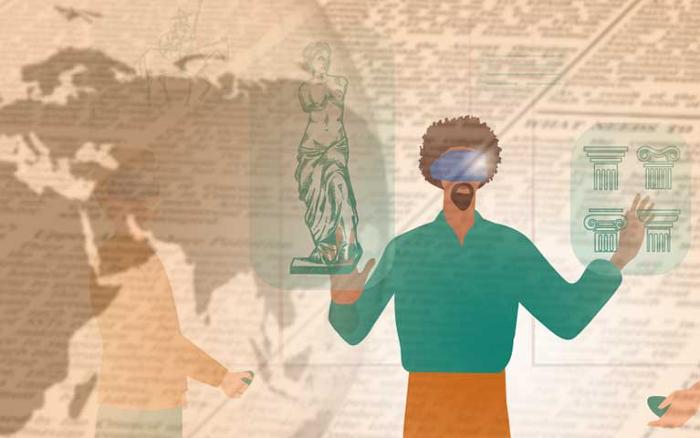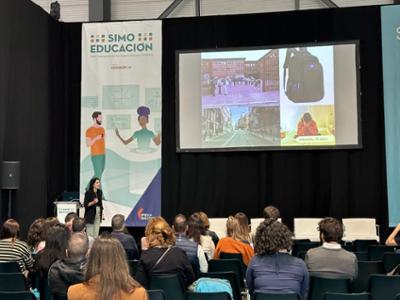

SIMO EDUCACIÓN selects the 35 most innovative educational experiences of 2024
Organised by IFEMA MADRID in collaboration with EDUCACIÓN 3.0, the event will take place from 19 to 21 November in Hall 5 of the Recinto Ferial.
The 35 selected educational experiences will be presented during the fair and will compete for the XII Awards for Educational Innovation, along with special awards for Best Innovative Teaching Experience and Best Innovative Experience.
Best practices in the classroom will, once again, be the highlight of the SIMO EDUCACIÓN 2024 activity programme, taking place from 19 to 21 November. Organised by IFEMA MADRID in collaboration with EDUCACIÓN 3.0, this event has announced the 35 Teaching Experiences selected by the Expert Jury from the over 200 submissions received for this edition.
These 35 Teaching Experiences, which will have the opportunity to present in a conference format during SIMO EDUCACIÓN 2024, have carried out innovative projects across several education levels, from Early Years to University, employing diverse methodologies to address themes and challenges such as emotional education, STEAM disciplines, and the use of emerging technologies. A total of 14 winners will be chosen for the 12th Awards for Educational Innovation. It will also compete for two special prizes: the 6th Award for the Best Innovative and Technological Teaching Experience 2024 and the 6th Award for the Best Innovative Experience 2024.
The Jury for this edition of the Educational Innovation Awards includes Carlos Magro from Educativa Abierta Association; Núria Sabaté, president of the Espiral Association, education and technology; Julio Albalad and Carlos Medina from INTEF; Francisco Javier Palazón from EDUCACIÓN 3.0; Linda Castañeda from the University of Murcia; Francisco Vico from UMA; Cristian Olive, Language and Literature teacher; Teresa Rabazas from Universidad Complutense Madrid; and Coral Elizondo, an advisor, expert, and activist in inclusive education.
These are the 35 experiences nominated for each of the awards in the various categories:
Best Experience with Active Methodologies:
High School Changemakers. Empowering Students with the 2030 Agenda, by Piedad Isabel Garrido Ruiz at IED Ifach in Calpe (Alicante), promotes students as agents of change using various active methodologies that not only work on curricular content but also foster entrepreneurial spirit, sustainability, and critical thinking.
17 SDG for a better world. Time to Take Action, by Fernando Ibiza Fuster at Colegio Nuestra Señora del Carmen in Gandía (Valencia), transforms Year 10 students into critical agents and disseminators of the SDGs through an active learning project that promotes service learning.
Best Collaborative and Cooperative Project:
Collaborative Technological Map of Andalucía, by IES Los Cerros in Úbeda (Jaén) as the coordinator of eight participating centres, aims to disseminate heritage in technological companies in Andalusia and raise students' awareness of job opportunities in the region.
Zarandona Escool, a project from CEIP San Félix in Murcia, involves creating a means of communication with Year 6 Primary students to enhance their linguistic competence using ICT and TAC.
Best Innovative Experience in Early Years and Primary:
Backpackers across Spain, by Elena Gozálvez in the second level of Early Years at CEIP José Llorer Talens in Almansa (Albacete). It aims to promote a culture and co-educational practices that foster progress towards equality through gamification.
Ctrl+Alt+Learn! TechKids Project for Digital Literacy at Maristas Centro Cultural Vallisoletano (Valladolid) promotes ethical policies to ensure responsible technology use in the classroom and protect students' privacy through digitally inclusive and ethical education.
The Theft of the Mona Lisa, by Fátima María Rodríguez at CEIP Natalio Rivas in Albuñol (Granada), engages students in solving the case of the famous painting's theft through active methodologies and project-based and challenge-based learning, allowing them to observe and explore their environment and gain autonomy.
Best Innovative Experience in Secondary and Baccalaureate:
Museum of Ecijan Oil by Rebeca Madero at Colegio Diocesano Santa María Nuestra Señora in Écija (Seville). The project arises from the need to enhance tourism in the city while fostering technological entrepreneurship and STEAM vocations among students, particularly girls.
Approaching you. From the Prado to the Metaverse, by Susana Nadal and Leo Giner at Colegio Sagrada Familia in Alzira (Valencia), is an interdisciplinary project where, through the subjects of Arts and ICT, students have explored and approached the artistic legacy by creating their own works using AI, VR, and AR.
Silenced Voices at IES Clot de I’llot in El Campello (Alicante) has taken students back to the Post-War period, researching popular songs that were once censored, reflecting on their lyrics and recreating them in a virtual reality that represents an uncensored euchronia.
Best Innovative Experience in Higher Education:
Integrated Project 1st DAM-DAW, developed by José Miguel Fajardo at IES La Vereda (Valencia), aims to guide students towards the world of work using agile methodologies and cooperative work, having developed an End-to-End software application.
Planet Junk. Collective Identity and Future Design, by lecturer Helena Galán at Carlos III University (Madrid), seeks to challenge the notion of a fixed and exclusive identity and foster the collective identity of students in the Audiovisual Communication Degree.
Best STEAM Experience:
Agricultural Robotics in Water Management at IES Ciudad de Dalías (Almería) has successfully developed a pioneering project integrating multiple STEAM disciplines to create an automated irrigation system with advanced sensors for monitoring and controlling a greenhouse, promoting environmental responsibility, inspiring future careers, and developing teamwork.
Maker Space: the creative heart of our educational community developed by Cristian Ruiz at Colegio Juan de Lanuza, where students explore and develop STEAM projects collaboratively, providing access to emerging technologies.
Steam with Gaya at Cierva at CEIP Cierva Peñafiel in Murcia is a collaborative STEAM project aimed at raising awareness of the Murcian painter Ramón Gaya, who was educated at the school.
Best Gamification Experience:
Timeline Revolution, by Mª José Amador at CEIP Agustín Rodríguez in Puente Genil (Córdoba), has allowed students and their families to travel through time to discover how humanity has evolved alongside the issues currently facing our planet.
Avatars on Earth: A Journey to the Unknown, by Tomás García at Colegio Buztintxurri in Pamplona, integrates scientific content into a gamified narrative aimed at developing useful life skills through "knowing", "knowing how to do", and "knowing how to be".
Biolast of Us, by David Porcel at IES Al-Ándaluz in Almuñécar (Granada), adapts ‘The Last of Us’ video game through which students enjoy a physical and digital adventure of surviving and exploring biological knowledge with the goal of saving humanity.
Best Emotional Education Experience:
Emotional Education in the Metaverse, at IES Los Valles de Camarzana de Tera (Zamora), has created an educational centre in the metaverse offering various activities to secondary and sixth form students, focusing on emotional education while also covering content related to different subjects.
We are English at Escola Splai de Nou Barris (Barcelona), encouraging the creation of YouTube videos in English to improve language competence among students, the educational community involved in eTwinning projects and adult class participants.
The EuroInnova Journey, by Ana García and Miguel Ángel Azorín, in the Master’s Programme in Educational Innovation at the European University of Madrid, has set challenges for students involving missions, research, digital tool use, and AI according to the areas of the Future Classroom.
Best ICT Project for Inclusive Education, Equality, and Diversity:
LEDUCAS: Creation of interactive pictograms with the micro: bit board, by Marc Gudel, Marina Tudela, and Montserrat Rodríguez at the Palma de Mallorca School (Barcelona), has enabled students to design interactive pictograms through programming micro: bit boards to communicate with a classmate, Lucas, who has Down syndrome and does not communicate verbally.
Paola Vergano's A Crime has been written at the IES Montes Orientales (Granada), employs an educational breakout to solve a real crime in the Munich Olympics in 1972 through a series of tests related to the subjects of the school.
Best Proprietary Digital Resource:
Super Eco Girl 3. Save the World!, by Raúl Lara at CEIP Sanchís Guarner in Ondara (Alicante), is a project based on a video game application designed by Year 5 Primary students aimed at encouraging correct recycling and educating about care for the Planet.
Historiarte los Sentidos is a project by IES Alpujarra (Granada) carried out in the Baccalaureate of all branches of education in order to educate in values through culture. The project includes a podcast and a website featuring educational materials from each episode, available in Spanish, English, and French.
Best Sustainability Experience:
The Traveller Bicycle, by Víctor Arufe at the University of A Coruña, is a service-learning experience designed to promote an active lifestyle from childhood, whereby 25 wooden balance bikes for children aged two to six are sent to an Early Years Centre in A Coruña every year.
Sustainable Experiences in Our Environment, by Teresa Casaña and Gema Ferrero at CEIP Tomás Albert in Albuixech (Valencia), raises students' awareness of the necessity of environmental conservation, particularly concerning marine ecosystems. This project involves creating natural dyes and inks and applying these in the production of innovative artistic proposals, using readily available materials to develop alternative solutions to chemicals.
Best Gender Equality Experience in the Classroom:
I deserve a Street 2.0. Objective Equality, developed by Ernesto Bautista at Colegio Cra. Villas del Tajo in Puente del Arzobispo (Toledo) aims to educate students about the significant women in history, connecting them to the legacies and lessons of key female figures in the development of science while promoting interest in STEM careers.
Alien Invasion, by Mónica García at CEIP Valle de Losa in Quincoces de Yuso (Burgos), is an innovative tool for managing interventions in the classroom through gamification and role-playing, aimed at fostering values-based education, improving executive functions such as inhibition, and reducing the gender gap in terms of participation and leadership.
Artemis Generation is a project developed by Francisco Delgado with students in gifted education workshops in Ávila, aimed at encouraging girls to pursue scientific careers. It invites them to explore previously unvisited regions of the Moon, thus linking the unknowns of space with the curricular content of Science, Languages, and Mathematics using robotics and virtual reality.
Best Educational Experience in Artificial Intelligence:
Rescuing the classics of Spanish romantic literature: an AI project in the classroom, by María José Gómez at Colegio Agustiniano in Madrid, enhances the understanding and exploration of Spanish Romantic literature while using AI tools to interact with texts, enriching comprehension and appreciation of this literary period.
DiGiTalise Traffic with Artificial Intelligence?, by teacher Pablo Dúo at CEIP Príncipe Felipe in Ceuta, enables Year 5 students to create their own AI models based on Machine Learning to identify traffic violations while analysing the benefits, biases, and risks of incorporating AI into traffic management.
Through Imperialism 4.0, teacher Miguel Ángel Pereira from IEL Giner de los Ríos (Lisbon, Portugal) allows students to bring historical figures from the times of the Empire to life using AI tools, enabling them to dialogue and interact with these characters.
Best experience in a Rural School:
The Galaxy Mission at CRIE Naturávila in Ávila combines virtual reality, 3D printing, educational robotics, Minecraft, and micro-experiences to empower students to develop the essential skills needed to complete the mission. This engaging approach not only enhances their literacy but also strengthens their competencies in STEM subjects.
Working Hard for the Tajo, by Victoria Carrasquilla and Ernesto Bautista at Colegio Cra. Villas del Tajo (Toledo) is a project designed to raise awareness and inform students about environmental care, particularly concerning the river they coexist with. This is achieved through active methodologies such as service learning and gamification.





